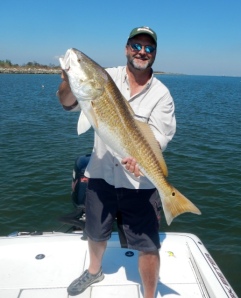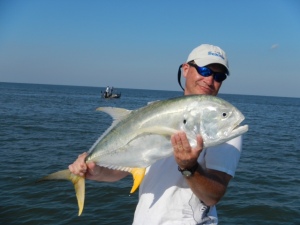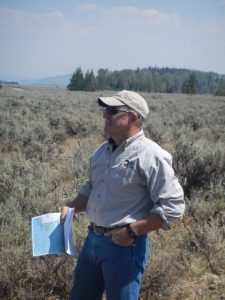
Louisiana Sportsman magazine owner Tony Taylor and a thick flounder. Photo: Lew Carpenter
Venice, LA – The incredible value of the Louisiana wetlands spans economic, cultural and environmental functions too great to be lost by any one generation. And as the rapid loss of wetlands continues it is important to note that we can fix this problem. We must. It’s a responsibility we have to be sure future generations can enjoy one of the world’s great ecosystems.
Just how important this resource is to sportsmen was never more evident than this past week when a hearty group of anglers descended upon the marsh to chase bull redfish as they have each year for well beyond a decade. This group of more than 50 anglers engage in a self-titled “Marsh Madness” event that brings together boaters from Louisiana and Mississippi with hunting and fishing industry representatives, outdoor writers and Vanishing Paradise. Many proclaimed the fishing has never been more dynamic – a galvanizing statement that places the value of this resource in the crosshairs of the importance of restoration. We simply cannot afford to lose this sportsman’s paradise.
Heading into a violent batch of thunderstorms that seemed to camp directly on the marsh it was tough to determine how the three days of fishing would unfold. Day one we waited out the torrential morning rains and headed out around lunch into strong winds and dark skies.
Tony Taylor, owner of Louisiana Sportsman magazine remarked on the damage of Hurricane Isaac as he made his first dive into the marsh since the devastation. “It’s hammered, it’s blown out,” he remarked, as we pushed through the marsh looking for clean water and cover from the wind. The roseau cane was battered and flattened everywhere we looked and it was obvious the hurricane had compounded the rapid loss of wetlands in the area. Without a good source of incoming freshwater sediment the marshes ability to recover is severely compromised.

Author Lew Carpenter with an 18-pound bull redfish. Photo: Land Tawney
We picked away at the rat reds until we moved into the river and Taylor’s rod bent further than one could imagine. The fight went on for 15 minutes before a fat jack crevalle came to boat. From that point on we were into decent reds and big flounder – all on the great jigs provided by Top Brass Tackle, the organizer of the event and ZMan plastic baits.
Day two, the weather began to subside, though it was cool by Louisiana standards. The red were increasing in size as we pitched along the rip rocks, points and cuts of the marsh edge.
Day three, the magic revealed itself. The class size of the reds increased. I landed an 18 pounder and followed it with a 16 before we headed to South Pass and nearly every fish was between 12 and 30 pounds! If this wasn’t a testament for saving the marsh, nothing would be. One fish after another came to boat all afternoon, mixed in with powerful jack crevalle, sharks and speckled trout to 8 pounds. It was a remarkable sight, and an unforgettable experience.
The Marsh Madness team truly understands the value of this special place, and some, like Eric Cosby of Top Brass have traveled in

Eric Cosby of Top Brass Tackle and a nice jack crevalle. Photo: Lew Carpenter
the recent past to Washington DC to speak to their senators about passing the Restore Act. With the help of sportsmen, the Act was passed this summer, directing 80 percent of the BP oil spill fines under the Clean Water Act to go back into restoring the wetlands. A great victory for sportsmen and the ecosystem.
And it’s not just these sportsmen of Marsh Madness who care, Field and Stream and other media outlets are reporting on a recent poll by GOP-aligned polling firm Chesapeake Beach Consulting on key conservation issues among 800 hunters and anglers conducted for the National Wildlife Federation. The poll shows this fairly conservative set of voters wants more action on a range of conservation issues that remain inadequately address in this election cycle. The composition of respondents was 55% both anglers and hunters; 33% anglers only; and 12% hunters only. NWF and its local affiliates, field and supporters are urging candidates for office around the nation to pay more attention to critical conservation issues.
The political preferences of those polled was:
• 42%, Republican; 32%, Independent; 18% Democrat;
• 27% indicated they split their ticket;
• 50% consider themselves conservative, including 22% who consider themselves to be very conservative;
• 60% said that they vote in every election and additional 21% said they vote in almost all elections.
The sample was randomly drawn from a list of self-identified hunters and anglers (sources included magazine subscribers, hunting and fishing license holders, and members of sporting groups). To qualify, a respondent had to indicate that he/she is a hunter, an angler or both and a registered voter. All interviews were conducted by telephone, including 15% of the interviews by cell phone. The margin of error for this study is plus or minus 3.2% at the 95% confidence level.
The poll offers some insights for the Louisiana wetlands and the region as it continues to recover from the BP disaster.
Among respondents in the national poll:
• 81% believe that BP should be held accountable and fined the maximum amount allowed for the 2010 oil spill and required to restore the Gulf to ensure the recovery of fish and wildlife populations.
- 87% of hunters and anglers want BP fines and penalties to be used exclusively to restore fish and wildlife habitat and not for infrastructure such as roads, bridges, ports and convention centers. For those who identify with a political party, 81% of Democrats and 88% of Republicans agree.
Many of the sponsors for Marsh Madness signed on to NWF’s letter to Congress on the Restore Act, and we’d like to thank Top Brass Tackle, Plano Molding, BASS, Louisiana Sportsman magazine, Seaguar Line, WileyX sunglasses, ZMan baits, RealTree Camo, Skeeter Boats, and Under Armor clothing for their support of this event and its ability to highlight the tremendous value these wetlands provide to the American sportsman and the wildlife within.
Read Full Post »






